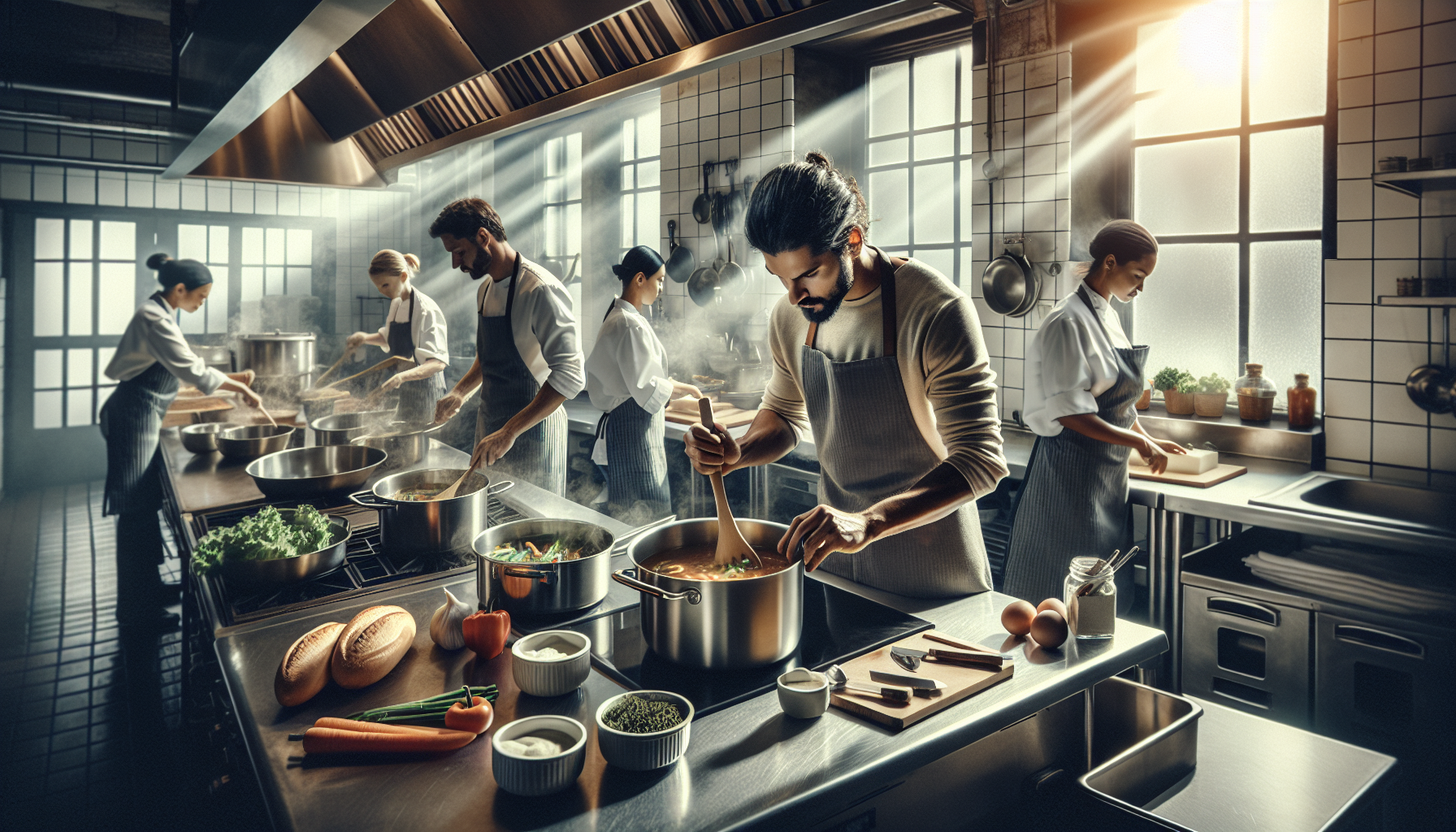The Rise of Culinary Programs
The Evolution of the Culinary Industry
Cooking has always been an integral part of our culture, but in recent years, it has experienced a massive surge in popularity. With the rise of food blogs, cooking shows, and social media platforms devoted to all things gastronomy, more and more people are embracing their inner chefs.
The Need for Culinary Education
As the culinary industry continues to grow, so does the demand for skilled professionals. This has led to the rise of culinary programs designed to equip aspiring chefs with the necessary skills and knowledge to succeed in this competitive field.
Benefits of Culinary Programs
Enrolling in a culinary program offers numerous benefits for aspiring chefs. Here are just a few:
- Professional Instruction: Culinary programs provide access to expert chefs who have years of experience in the industry. They can offer valuable insights and guidance that cannot be replicated through self-study alone.
- Hands-on Experience: Many culinary programs emphasize practical training, giving students ample opportunities to practice their skills in real-life kitchen settings. This hands-on experience is invaluable for developing proficiency in the culinary arts.
- Networking Opportunities: Culinary programs often connect students with industry professionals through internships, guest lectures, and networking events. These connections can open doors to potential job opportunities and mentorship.
- Specialized Education: Culinary programs offer specialized courses that focus on specific cuisines, techniques, or areas of the culinary industry. This allows students to develop expertise in their desired niche, making them more marketable in the job market.
Choosing the Right Culinary Program
With the increasing number of culinary programs available, it’s essential to choose the right one for your career goals. Here are a few factors to consider:
- Accreditation: Ensure that the culinary program you choose is accredited by recognized culinary organizations. This ensures that the program meets industry standards.
- Curriculum: Review the program’s curriculum to ensure it aligns with your career aspirations. Look for courses that cover the areas you wish to specialize in.
- Facilities and Resources: Visit the program’s facilities and assess the quality of the kitchen equipment, library resources, and other amenities that will contribute to your learning experience.
- Internship and Job Placement: Inquire about the program’s internship and job placement services. A strong network of industry connections and assistance with job placement can significantly boost your chances of landing a job after graduation.
The rise of culinary programs is a testament to the growing popularity of the culinary industry. By enrolling in a culinary program, aspiring chefs can gain the skills and knowledge they need to succeed in this competitive field. With a focus on professional instruction, hands-on experience, and networking opportunities, culinary programs provide a solid foundation for a rewarding culinary career. So, whether you dream of running your own restaurant or working as a private chef, a culinary program may be the key to unlocking your culinary potential.
Exploring the Benefits of Culinary Education

Developing Essential Skills
One of the key benefits of pursuing a culinary education is the development of essential skills that are valuable in the kitchen and beyond. Aspiring chefs gain hands-on experience in cooking techniques, food preparation, and presentation. They also learn about kitchen safety, sanitation, and time management. These skills are not only crucial in a professional kitchen but also transferable to other careers in the food industry.
Expanding Culinary Knowledge
A culinary education provides individuals with the opportunity to explore various cuisines, cooking methods, and ingredients. Through culinary courses, students are exposed to a wide range of culinary traditions and techniques, enabling them to expand their culinary knowledge and palate. By learning about different food cultures, students can develop a deeper appreciation for food and its role in society.
Career Opportunities
Upon completing a culinary education, aspiring chefs have access to a myriad of career opportunities in the culinary industry. Graduates can pursue careers in restaurants, hotels, catering services, and private businesses. They can also work as personal chefs or food stylists. Furthermore, a culinary education provides a solid foundation for those who aspire to be entrepreneurs, as it equips them with the skills and knowledge needed to start their own culinary ventures.
Networking and Industry Connections
Another benefit of culinary education is the opportunity to build a network of industry connections. Culinary schools often have partnerships with industry professionals, allowing students to gain exposure to potential employers and mentors. Through internships and externships, students can establish valuable relationships and gain practical experience in a real-world kitchen setting. These connections can be instrumental in kick-starting a successful culinary career.
Creativity and Innovation
Studying culinary arts encourages creativity and fosters innovation in the kitchen. Culinary students are given the freedom to experiment with flavors, textures, and presentation techniques, allowing them to develop their own unique culinary style. Through creative exploration, students learn how to push the boundaries of traditional cuisine and create innovative and inventive dishes that showcase their individuality and culinary expertise.
Personal Enrichment
A culinary education goes beyond just professional development; it also enriches individuals personally. The art of cooking provides a sense of fulfillment and satisfaction, allowing individuals to express their creativity and passion. Culinary education fosters a love for food and an understanding of its cultural and social significance. Whether cooking for loved ones or exploring new flavors, culinary education enhances one’s overall quality of life.
A culinary education offers a multitude of benefits, ranging from the development of essential skills to expanding culinary knowledge and unlocking a world of career opportunities. It nurtures creativity, fosters personal enrichment, and provides a platform for lifelong learning and growth. By pursuing a culinary education, individuals can embark on a journey of exploration, creativity, and passion in the world of food.
The Practical Skills Learned in Culinary Programs

The Art of Knife Skills
Mastering the art of knife skills is one of the most fundamental and important practical skills that aspiring chefs learn in culinary programs. From dicing onions to filleting fish, precise knife work is essential for every dish. Culinary programs teach students how to handle and care for different types of knives, as well as techniques such as the julienne, chiffonade, and brunoise cuts. Strong knife skills not only improve efficiency in the kitchen, but also enhance the presentation and taste of the final product.
Food Preparation and Cooking Techniques
Culinary programs provide hands-on training in a variety of food preparation and cooking techniques. Students learn how to properly season and marinate meats, sauté vegetables to perfection, and create delicious sauces from scratch. They also gain a deep understanding of different cooking methods, such as grilling, baking, boiling, and braising. By honing these techniques, aspiring chefs develop the ability to prepare a wide range of dishes with precision and creativity.
Menu Planning and Recipe Development
In culinary programs, students are taught the art of menu planning and recipe development. They learn how to create balanced and cohesive menus that cater to different dietary preferences and restrictions. Through experimenting with flavors, ingredients, and cooking techniques, students develop their own unique recipes. They also learn how to adapt and modify recipes to accommodate varying tastes and ingredient availability. The ability to plan menus and develop creative recipes is crucial for success in the culinary industry.
Food Safety and Sanitation
Food safety and sanitation is another essential skill that culinary programs emphasize. Students are taught proper food handling, storage, and preparation techniques to prevent foodborne illnesses. They learn how to maintain clean and organized workstations, follow HACCP (Hazard Analysis Critical Control Point) principles, and implement proper hygiene practices. These skills not only ensure the health and safety of both the chef and the customers, but also contribute to a positive working environment in the kitchen.
Time Management and Organization
Culinary programs instill in students the importance of time management and organization in a fast-paced kitchen environment. Aspiring chefs learn how to efficiently multitask, prioritize tasks, and work under pressure. They develop the ability to streamline workflows, plan ahead, and meet deadlines without compromising on quality. These skills are crucial for success in a professional kitchen, where time is of the essence and mistakes can have significant consequences.
Creativity and Presentation
Lastly, culinary programs nurture creativity and teach students how to present dishes in an aesthetically appealing manner. Chefs-in-training are encouraged to experiment with flavors, textures, and plating techniques to create visually stunning dishes. They learn how to use ingredients as artistic elements and explore innovative culinary concepts. By developing a strong sense of creativity and presentation, aspiring chefs are able to elevate their dishes and leave a lasting impression on diners.
In conclusion, culinary programs provide aspiring chefs with a wide range of practical skills that are crucial for success in the culinary industry. From mastering knife skills to developing creative recipes, these programs equip students with the knowledge and hands-on experience they need to excel in the kitchen. Whether aspiring to become a restaurateur or a personal chef, the practical skills learned in culinary programs lay the foundation for a fulfilling career in the culinary arts.
Unlocking Your Potential through Culinary Programs

Unlocking Your Potential through Culinary Programs
Are you passionate about food? Do you dream of becoming a master chef one day? If so, you’re in luck! Culinary programs offer a unique opportunity to unlock your potential and turn your passion into a successful career. Whether you’re a beginner or already have some knowledge in the culinary arts, enrolling in a culinary program can provide you with the necessary skills and knowledge to excel in the industry.
Developing Culinary Skills
One of the key benefits of culinary programs is the opportunity to develop your culinary skills. These programs provide hands-on training in various culinary techniques, cooking methods, food preparation, and presentation. From learning the basics to advanced culinary skills, you’ll gain a solid foundation in the art of cooking. Under the guidance of experienced chefs, you’ll be able to hone your skills and improve your techniques, ensuring that you become a skilled and confident chef.
Learning from Industry Experts
Culinary programs give you the chance to learn from industry experts and experienced chefs. These professionals have a wealth of knowledge and experience in the culinary world. Through their guidance and mentorship, you’ll not only learn cooking techniques but also gain insights into the industry. They can provide you with invaluable advice, teach you about different cuisines, and share their own experiences. Learning from these experts can greatly enhance your culinary journey and help you achieve your goals.
Exploring Different Cuisines
Another exciting aspect of culinary programs is the opportunity to explore different cuisines from around the world. These programs often include modules or classes that focus on various international cuisines. You’ll be exposed to different flavors, ingredients, and cooking styles, allowing you to broaden your culinary horizons. This exposure can be particularly useful if you aspire to work in diverse culinary environments or want to specialize in a particular cuisine.
Networking and Career Opportunities
Culinary programs also offer excellent networking opportunities. You’ll have the chance to connect with fellow aspiring chefs, industry professionals, and potential employers. Building a strong network in the culinary world can open doors for future career opportunities, collaborations, and even mentorships. By actively participating in culinary programs and engaging with others in the industry, you can expand your professional network and increase your chances of success in the culinary field.
Enrolling in culinary programs can be a game-changer for anyone passionate about food and cooking. These programs not only provide the necessary training and skills but also open doors to exciting culinary opportunities. Through hands-on experience, learning from industry experts, exploring different cuisines, and networking, you can unlock your full potential and embark on a rewarding culinary career. So, don’t wait any longer – enroll yourself in a culinary program and let your culinary dreams come to life!
